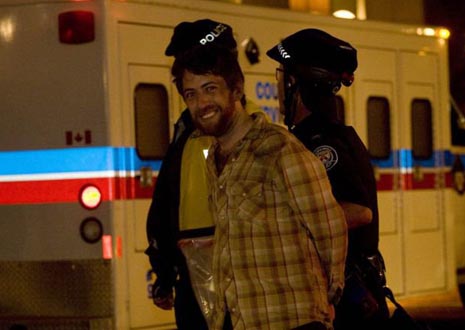Sitting in a five-foot-by-eight-foot freezing steel cage cell in the early hours of June 27 with six other people, the government’s message of silencing dissent and debate around the G20 was self evident.
Hours before I ended up in the benchless and bathroom-less cell, I was beaten and arrested while covering a demonstration that started when over a 1,000 people were forcibly dispersed from Queens Park — the one official free speech zone.
Picked up in a mass arrest of non-violent demonstrators in front of the Novotel Hotel — where the protesters had gone to demand answers from G20 delegates staying there and show support to striking workers, I had police regard my media credentials with contempt.
Despite asserting my right to cover the story as a journalist, notifying the police that I was working on assignment for the U.K. Guardian’s comment section as well as reporting with Alternative Media Centre, I was jumped on by several unprovoked officers and beaten with malice.
Interestingly, my beating only began after another officer had identified me as the “loudmouth kid” from the previous day; I had been demanding answers from Toronto police while they racially profiled, beat, and arrested an activist.
In general, my experience of violent arrest and detention was not unique for critical journalists who covered the debate on the streets and explored the substance behind grassroots demands for a new global economy and equal rights for all.
Indeed, those who joined the independently organized Alternative Media Centre — a collective of independent, freelance, and critical journalists who committed to sharing resources and working together to capture the story from the frontlines — were systematically targeted. More than 10 AMC journalists, all with visible and clearly labelled press passes, were picked off the streets, beaten, and jailed while reporting.
There were cases of AMC journalists who were filming illegal searches and arrests being searched and arrested themselves. There were AMC journalists who showed up to document the arrest of colleagues, who, in turn, were arrested and abused on site.
In the week leading up the G8 and G20 summits, the Alternative Media Centre held a well-attended press conference, where we announced to the rest of the media and public that we would be covering the demonstrations from their heart. We made clear that we would be committed to putting out investigative, hard-hitting critical journalism that explored the demands coming from the streets and made our media credentials known to the public.
However, by Friday the 25th, after we had published much criticism of the police and the government, the police began to systematically target AMC journalists, identifying our press passes and arresting us where they could.
On at least one occasion police attempted to raid our media centre without a warrant and were held back by the sheer determination of AMC staff. Even at our press conference on Monday, June 28, to announce the brutality and basic violation of human rights to which AMC journalists had been subjected, the police showed up across the street from our offices in an attempt at intimidation.
But the chill effect put on critical journalists paled in comparison to the consistent denigration, repression, and violation of basic human rights that went on inside the temporary jail set up at the old Toronto film studios. Inside this jail the government’s desire to silence those debating the G20 was exercised through the form of police terror.
Kept in handcuffs in overcrowded “processing” cells for hours on end, men huddled on the floors trying to deal with their injuries, while the police denied medication or medical treatment. Water was sparse, and food even more so. Despite freezing conditions, we had no access to sweaters or blankets. Once those incarcerated were finally moved to holding cells, they were so overcrowded that there wasn’t space for all the detainees to lie down on the concrete floor at the same time.
Men that were thought to be sexual minorities — including an AMC journalist — were threatened with anal rape with batons, while on the women’s side — journalists and activists alike — were strip searched by male officers and threatened by police with rape and gang rape.
Four of the journalists, including myself, have now lodged an official complaint about our treatment.
I saw a systematic effort to use crude violence and intimidation to divide, isolate and oppress people along gender, race and sexuality lines in the hope it would break them to the point of silence. Outside of the jails we saw a government try and control the discussion around the G20 through handpicked press conferences filled with soft-peddled questions and fluffy media releases.
Nonetheless, when global attention had shifted from the meetings to the demonstrations and Harper no longer had control of the debate; the police were sent in to brutally sweep protesters and the journalists engaging their debate off the streets.
Jesse Rosenfeld is a freelance journalist based out of Ramallah and Tel Aviv-Jaffa since 2007. Originally from Toronto, he was covering the demonstrations against the G8 and G20 for the Guardian’s Comment is Free section, and the Alternative Media Center when he was beaten and arrested. He is also the editor of The Daily Nuisance.



